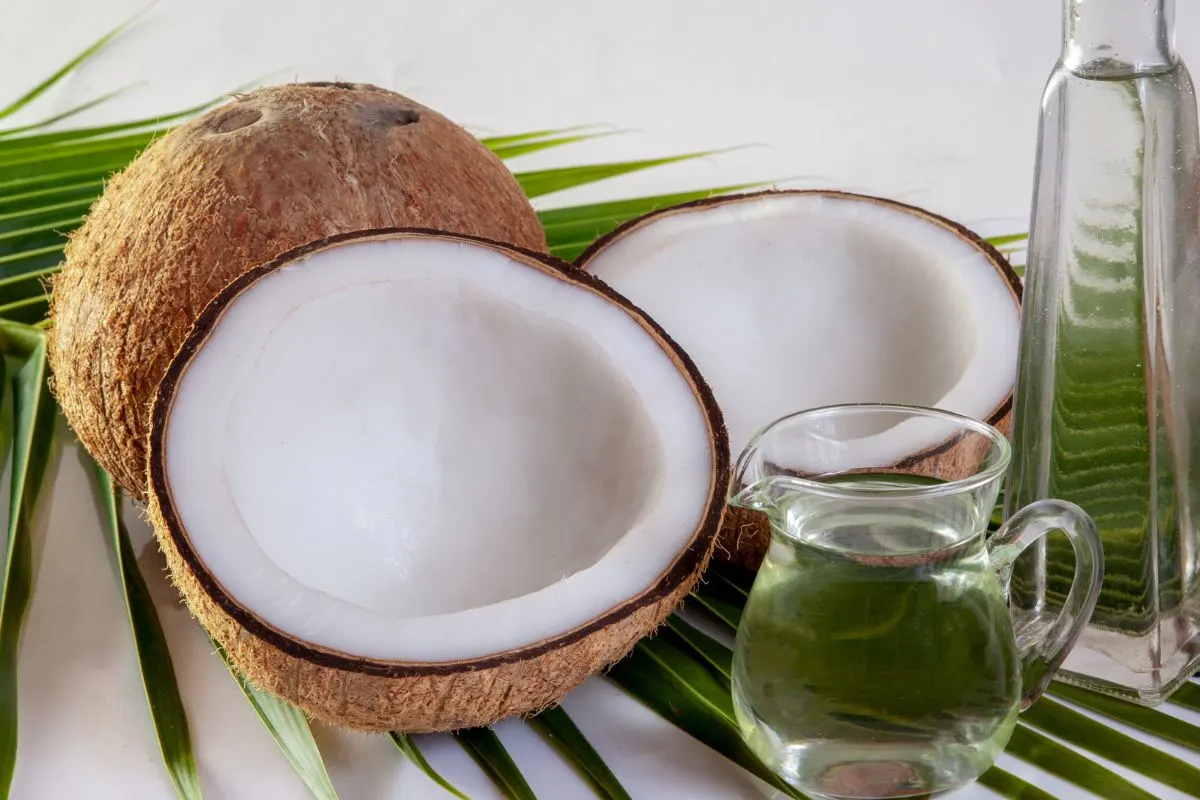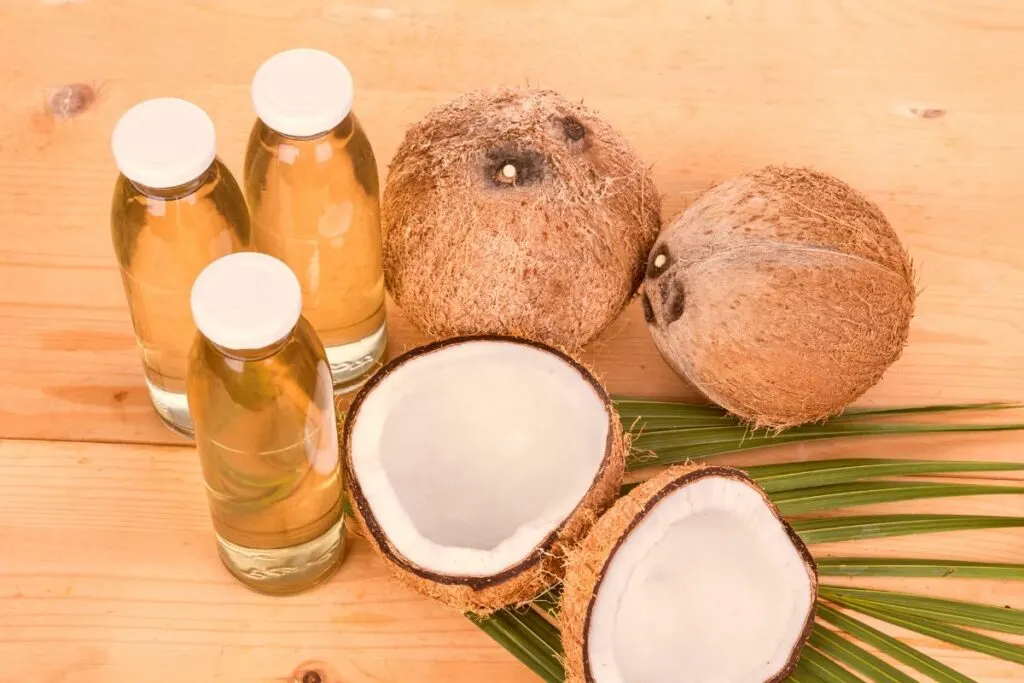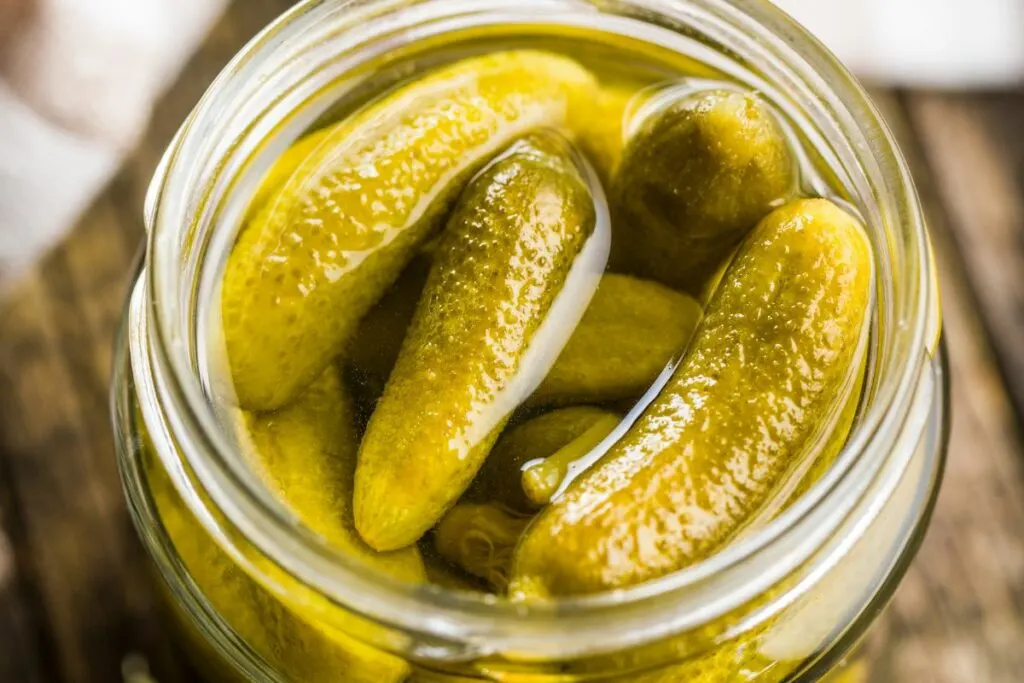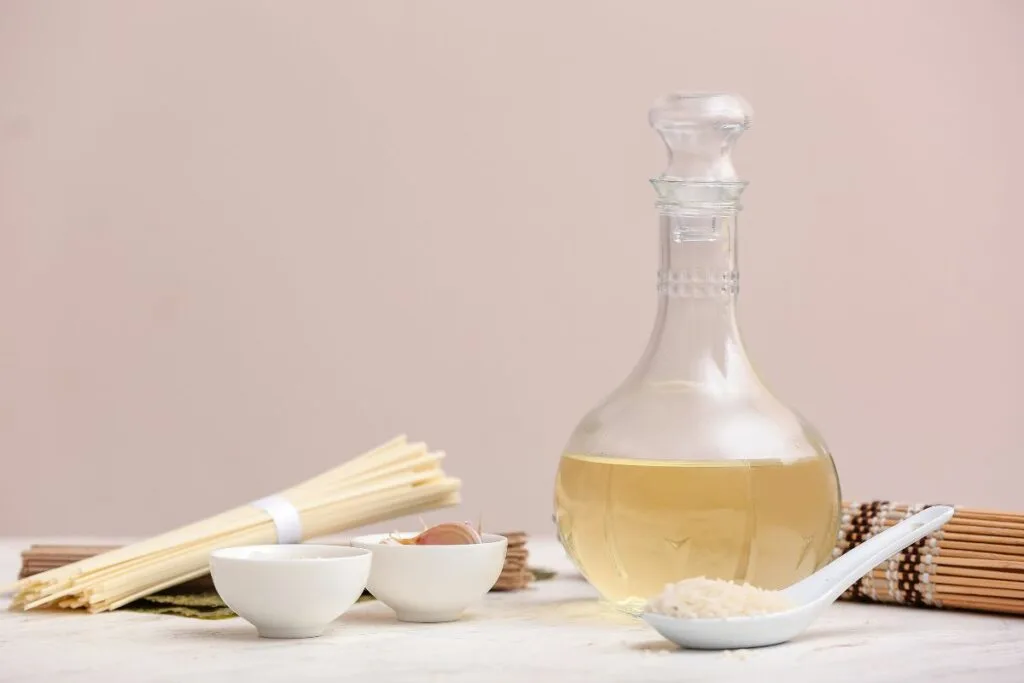Out of coconut vinegar and don’t have time to shop? Being a staple ingredient in Asian sauces and cuisines, I have some of the best substitutes for coconut vinegar. The best substitutes for coconut vinegar are Champagne Vinegar, Rice Wine Vinegar, White Wine Vinegar, and Lemon Juice. But this isn’t all! I’ll give tips, uses, and other coconut vinegar substitutes that’ll be just perfect for you.

Jump To
What is Coconut Vinegar?
Coconut vinegar is a type of vinegar made from the sap of coconut trees. The sap is collected from the flower buds of the coconut tree and then fermented for several months. The resulting vinegar has a cloudy appearance and a slightly sweet and sour taste.
Coconut Vinegar Benefits
This nutrient-rich vinegar is also a healthier alternative to vinegar. According to studies, the health benefits of coconut vinegar are similar to those of apple cider vinegar. It’s said to help lower blood pressure, stabilize blood sugar levels, and fight diabetes, though people with these issues should always consult with their healthcare provider before incorporating vinegar into their diet.
- Rich in Nutrients: Coconut vinegar is rich in nutrients such as vitamins, minerals, and amino acids, which are essential for maintaining good health. It contains potassium, calcium, iron, and magnesium, all important for maintaining healthy bones and muscles.
- Probiotics: This vinegar is a natural source of probiotics, which are beneficial bacteria that help to improve digestion and boost the immune system. Probiotics also help to maintain a healthy balance of bacteria in the gut.
- Lower Blood Pressure: Coconut vinegar may even help lower blood pressure, a risk factor for heart disease and stroke. It contains acetic acid, which has been shown to lower blood pressure in some studies.
- Stabilize Blood Sugar Levels: It may also help to stabilize blood sugar levels, these are important for people with diabetes. It contains acetic acid, which has been shown to improve insulin sensitivity and reduce blood sugar levels.
How to make coconut vinegar
For those with access to coconut palm trees, there are several ways you can make coconut vinegar at home. The traditional method is to ferment coconut sap nectar in open clay jars under the sun, making use of the natural yeast found in the air. It can also be made by starting fermentation by combining yeast with natural sugars and coconut water. Though it will take several months to produce excellent flavor, it’ll be worth the wait.

How to Use Coconut Vinegar
Versatility in Enhancing Flavors:
- Coconut vinegar brightens dishes, harmonizing rich flavors by adding sweetness and acidity.
- Acts as a pickling agent in salad dressings, marinades for meat, sauces, soups, stews, and sweet and sour dishes.
- Infusing coconut vinegar with fresh herbs creates a well-balanced flavored vinegar.
Historical Use in the Philippines:
- In pre-colonial Philippines, coconut vinegar preserved food and was a key ingredient in basic dishes like boiled soup and kinilaw, a fish dish cooked in acidic vinegar juices.
Specific Recipes Incorporating Coconut Vinegar:
- Pickled vegetables (try them with the vegetables mentioned, or our personal favorite: pickled red onions. These go great on a Reuben sandwich, carnitas tacos, or Wagyu beef burgers).
- Coconut Vinaigrette for a bright kale & dried cranberry salad
- A Filipino chicken adobo using coconut vinegar
- Roasted Porchetta
- Coconut barbecue marinade
- Chicken Pad Thai
- Thai Coconut Caramelised Prawns
- Thai cold chicken salad
- Tatemado de Colima (braised pork) with a cup of chilled tuba

6 Best Coconut Vinegar Substitutes
Many common varieties of vinegar, such as dark balsamic or tangy apple cider vinegar, are suitable substitutes for coconut vinegar. Just take caution at the start by adding half of the called-for amount of the substitute and then tasting it before adding some more.
Champagne Vinegar
Champagne vinegar is made from fermented dry white wine from the Champagne region of France. It particularly complements salad dressing with its light, tart, sweet flavor and lower acidity.
This makes the best substitute for coconut vinegar because it is the closest match in taste. Both have a mild vinegar flavor. Use at a 1:1 ratio in dishes. However, it may be difficult to procure champagne vinegar as it is not commonly used in many kitchens.
Rice Wine Vinegar
Rice wine vinegar, also known as rice vinegar, is a commonly used Asian vinegar crafted from fermented white, brown, or black rice. It is made by fermenting the sugars and starches in the rice into alcohol and then into acid, which gives it the typical vinegar flavor and aroma.
The delicate flavors are similar to coconut vinegar, with a slightly milkier and sweet taste. This makes it an excellent swap at a 1:1 ratio in your recipe.
White Wine Vinegar
When wine is soured, its natural sugars turn into acetic acid. This is then strained and bottled as white wine vinegar. Light-tasting wine vinegars are a great substitute for mild-tasting coconut vinegar. It offers a mellow, tangy, and zingy vinegar flavor that may be used in healthy sauces, dressings, and as a pickling agent.
For every tablespoon of coconut vinegar that you were supposed to use in your recipe, you can use an equal amount of white wine vinegar.

White Vinegar + Sweetener
We’re including white Vinegar here because it’s widely available in stores and likely in many kitchen cupboards. Traditional white Vinegar, also called ‘spirit vinegar,’ is made from fermented potatoes, molasses, beets, or sugar cane, while contemporary ones are made from ethanol or grain alcohol. Most white vinegars are 93-96% water with 4-7% acetic acid concentration.
They are typically odorless, with a prominent sour flavor, but can have a high percentage of pure acid, though these higher percentages are for agricultural and cleaning purposes. White Vinegar’s strong flavor can be used as an alternative to coconut vinegar in a 1:2 ratio by adding water & a pinch of a sweetener to offer more sweetness to the dish.
Apple Cider Vinegar + Honey
Apple cider vinegar is another popular vinegar, thanks to its varying health benefits. Crushed apples, yeast, and sugar are used to make this type of fruit vinegar. Over several weeks, the yeast digests the sugars in the apple juice, fermenting it into alcohol before it breaks down into acetic acid.
Given the strong flavor of apple cider vinegar, we substitute a mixture of one cup of apple cider vinegar and two tablespoons of honey for each cup of coconut vinegar. If your recipe calls for sugar, use a 1:2 ratio without sweetener instead, starting with small increments and then tasting the dish before adding the rest of your apple cider vinegar.
Lemon Juice
Lemon juice and vinegar have a lot in common; they both have acidic properties that may be required to add tartness in your recipe. They do, however, serve different purposes and have distinct flavors. When using lemon to replace coconut vinegar in a recipe, use a 2:1 ratio, substituting the rest of the liquid with water.
You can also directly substitute lemon juice for coconut vinegar in your recipe, depending on what you’re making; this works best in small amounts. Consider the overall change in the flavor of your recipe because of the lemon’s milder taste, and then proceed with half at first.
FAQs
Is coconut vinegar same as white vinegar?
No, coconut vinegar and white vinegar are not the same. Coconut vinegar is made from the sap of coconut flowers, while white vinegar is made from diluted grain alcohol.
What is a substitute for coconut vinegar in adobo?
A suitable substitute for coconut vinegar in adobo is a combination of equal parts of white vinegar and apple cider vinegar. This blend can replicate the slightly sweet and acidic flavor profile of coconut vinegar in the dish.
What are some uses for Coconut Aminos?
You can use coconut aminos as a marinade for meat or vegetables, as a dipping sauce for sushi or spring rolls, or as a seasoning for stir-fries and fried rice.
